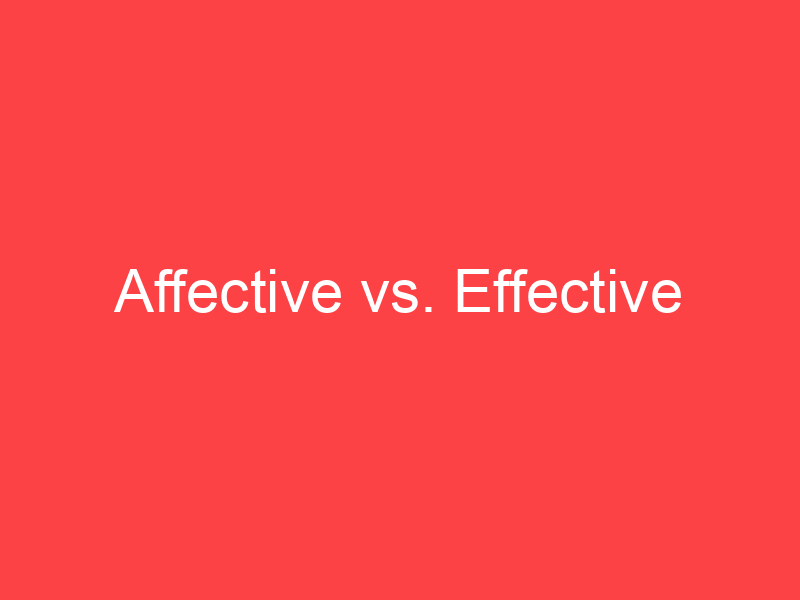Main Difference
The main difference between Affective and Effective is that the Affective is a experience of feeling or emotion and Effective is a capability of producing the desired result.
-
Affective
Affect is a concept used in psychology to describe the experience of feeling or emotion. The term affect (philosophy) takes on a different meaning in other fields. In psychology, affect mediates an organism’s interaction with stimuli. The word also refers sometimes to affect display, which is “a facial, vocal, or gestural behavior that serves as an indicator of affect” (APA 2006).
The affective domain represents one of the three divisions described in modern psychology: the cognitive, the conative, and the affective. Classically, these divisions have also been referred to as the “ABC of psychology”, in that case using the terms “affect”, “behavior”, and “cognition”. In certain views, the cognitive may be considered as a part of the affective, or the affective as a part of the cognitive; it is important to note that “cognitive and affective states … [are] merely analytic categories”.
Affective states are psycho-physiological constructs. According to most current views, they vary along 3 principal dimensions: valence, arousal, and motivational intensity. Valence is the subjective positive-to-negative evaluation of an experienced state. Emotional valence refers to the emotion’s consequences, emotion-eliciting circumstances, or subjective feelings or attitudes. Arousal is objectively measurable as activation of the sympathetic nervous system, but can also be assessed subjectively via self-report. Arousal is a construct that is closely related to motivational intensity but they differ in that motivation necessarily implies action while arousal does not. Motivational intensity refers to the impulsion to act; the strength of an urge to move toward or away from a stimulus. Simply moving is not considered approach (or avoidance) motivation without a motivational urge present.
All three of these categories can be related to cognition when considering the construct of cognitive scope. Initially, it was thought that positive affects broadened whereas negative affects narrowed cognitive scope. However, evidence now suggests that affects high in motivational intensity narrow cognitive scope whereas affects low in motivational intensity broaden it. The cognitive scope has indeed proven to be a valuable construct in cognitive psychology.
-
Effective
Effectiveness is the capability of producing a desired result or the ability to produce desired output. When something is deemed effective, it means it has an intended or expected outcome, or produces a deep, vivid impression.
-
Affective (adjective)
Relating to, resulting from, or influenced by the emotions.
-
Affective (adjective)
Emotional; emotionally charged.
-
Effective (adjective)
Having the power to produce a required effect or effects.
“The pill is an effective method of birth control.”
-
Effective (adjective)
Producing a decided or decisive effect.
“The president delivered an effective speech!”
-
Effective (adjective)
Efficient, serviceable, or operative, available for useful work.
“How long does it take to make a bunch of civilians an effective military force?”
“My effective income after taxes and child support is $500 a month.”
“The effective radiated power is determined by multiplying the transmitter power output with the antenna gain.”
“The effective voltage of an alternating current is 0.7 times its peak voltage.”
-
Effective (adjective)
Actually in effect.
“The curfew is effective at midnight.”
-
Effective (adjective)
Having no negative coefficients.

